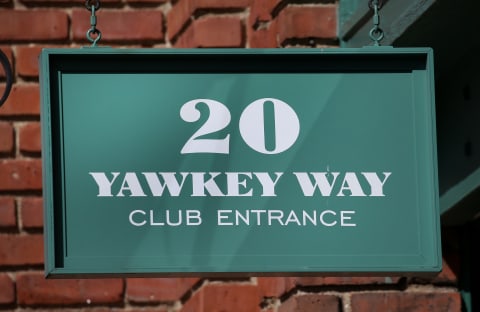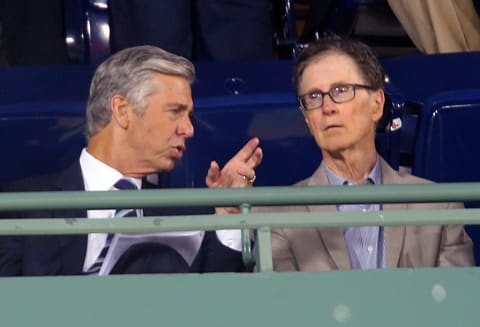Boston Red Sox and city of Boston rename Yawkey Way


With the renaming of Yawkey Way, the Boston Red Sox attempt to close the door on an ugly past.Iss the change enough to finally move on from it?
Baseball fandom is culture. It is literally learned behavior. None of us are born fans, as much as we’d like to claim otherwise. In the end, it’s tribal, and tribalism is a powerful force. It’s group-think at its best… and it’s worst. It’s familiar and comfortable and taps into some of our basest impulses — with the Boston Red Sox being no different.
So it’s no surprise that when something major is about to change in one of these tribes, there is resistance. Changing culture is hard, and the Boston Red Sox are giving us a look at just how hard that can be.
The city of Boston has decided to change Yawkey Way back to its original name, Jersey Street. The street was originally renamed to honor the longtime owner of the Boston Red Sox, Tom Yawkey, in 1977, the year after he died. The decision to restore the original name was made in concert with John Henry, principle owner of the Boston Red Sox, and the intent behind it is anything but ambiguous. From the linked article:
“Restoring the Jersey Street name,” the team has said in a statement, “is intended to reinforce that Fenway Park is inclusive and welcoming to all.”
The push to rename the street came at a time when the new cycle was being dominated by the removing of Confederate monuments across the country and on the heels of an incident in which Baltimore Orioles outfielder Adam Jones had been subjected to racial epithet during a May game at Fenway Park.
Was the change short-term thinking?
It would be easy to leap to the conclusion that the name change was reactionary, and perhaps it was, but that doesn’t mean it wasn’t long past due. After all, Tom Yawkey’s name carries with it a heavy reputation for racism stemming from the fact that the Boston Red Sox were the last team in baseball to integrate.
There are also anecdotes about Jackie Robinson trying out for the club in April of 1945. Allegedly a person in the stands shouted something vile at Robinson and the other two Negro League players trying out. The phrase was never attributed to an individual, but the incident stays with the club to this day.
And then there is the tenure of General Manager “Pinky” Higgins, who once famously declared that no black players would don the Red Sox uniform while he had anything to say about it to reporter Al Hirshberg. His language was a bit less polite.
Of course, Tom Yawkey has his defenders. The Yawkey Foundation has made efforts to disassociate his name from racism. Additionally, Boston Red Sox historian and writer Bill Nolin has been quoted as saying he has been unable find a “smoking gun” with regard to Yawkey’s purported racism, which you can read more about here.

A reputation is hard to shake.
Regardless of what your individual opinion on the matter may be, however, the Yawkey name carries the weight of a significant amount of circumstantial evidence pointing toward at least some degree of racism. And the Boston Red Sox share that burden to this day.
That’s not to say that the current iteration of the franchise is run by or employs racists. In fact, the 2018 roster has a great deal of diversity with just 15 of the 28 players to make an appearance this season being white.
The team’s biggest stars include Mookie Betts, Xander Bogearts, J.D. Martinez, Hanley Ramirez, Jackie Bradley Jr., and Rafael Devers — not to mention Alex Cora at the helm. But the team cannot simply ignore its past and current owner John Henry understands that.
So the driving force behind the name change is clear. What’s less clear is whether this is the best way to proceed if the goal is to heal the city and the fanbase — to bring people together. In many ways, this is no different than the decisions to remove Confederate statues in cities across the nation. The same arguments are had, the same divisions among the populace exist.
Pump the brakes.
Some argue that to remove these monuments, whether a statue or a street name, is an attempt to ignore or erase our history. And to do so is to risk repeating it. Others argue that holding previous generations to current standards is unfair.
On the other hand, if we wish to memorialize a segment of our history with a street name or a statue, why not replace one which is offensive to a large group of people with something that honors someone who was doing good or is emblematic of the change that was in the process of happening at the time?
For the Boston Red Sox, that could have been Pumpsie Green, the utility fielder who officially desegregated the Red Sox in 1959. Or perhaps Sam Jethroe who was the first black MLB player in Boston, who integrated the Boston Braves in 1950. In the end, the decision was made not to honor anyone with the renaming.
Another argument against the removal of Yawkey’s name from the street is that the Yawkey Foundation, founded through Tom Yawkey’s will, has done an enormous amount of good since his death and that the street name honors the foundation as much as the man.
Unfortunately, the foundation cannot divest itself of the Yawkey legacy while continuing to brand itself through the use of his name. And removing his name from the street does not remove it from the many buildings and institutions the foundation has been integral to.

What really matters is…
And in the end, what this comes down to is the argument that this move is purely for optics. That it is a symbolic gesture that doesn’t actually change anything. To that end, I will grant that opponents of the name change are correct. It absolutely is a symbolic gesture.
Where I disagree is that symbols do matter, and can matter a great deal. Rightly or wrongly, Boston still carries with it the stigma of being a racist city. Having spent plenty of time there, I would disagree with that assertion.
More from Call to the Pen
- Philadelphia Phillies, ready for a stretch run, bomb St. Louis Cardinals
- Philadelphia Phillies: The 4 players on the franchise’s Mount Rushmore
- Boston Red Sox fans should be upset over Mookie Betts’ comment
- Analyzing the Boston Red Sox trade for Dave Henderson and Spike Owen
- 2023 MLB postseason likely to have a strange look without Yankees, Red Sox, Cardinals
At least to the extent that it is any more racist than most other cities. Racism exists everywhere, unfortunately, but the reputation of Boston seems to hinge mostly on the reputation of Tom Yawkey and the team’s failure to integrate for so long.
Disassociating the franchise with the Yawkey name is a symbol to fans of all ethnicities that today’s Boston Red Sox welcome anyone and everyone to root for the team. It removes a symbol of a time when the team employed open racists and operated with racism as at least a partial driving force behind their day-to-day operations.
It makes a clear and concise statement that those days are behind us. This may feel like an empty gesture to some, but it is undoubtedly substantial to others.
And that’s what inclusivity is all about. It’s not a matter making the largest portion of a group comfortable or happy. It’s about making as many people happy as possible. Sometimes that means making things a little less comfortable for a historically catered to subset of the fanbase, but that’s okay. Change is hard — especially when that change is on a cultural level.
It’s time.
The Yawkey name has been an integral part of the Boston Red Sox identity the entire lives of most of the team’s fans. But it’s time for the title to fade into history. These aren’t your father’s Red Sox. They steal bases, play great defense and have outstanding starting pitching. And they are making an effort to make sure that no one feels marginalized at Fenway Park.
If you (like me) are not one of the people that effort is aimed at, the best thing we can do is step back and let this moment happen without strife. It’s been a long time coming.